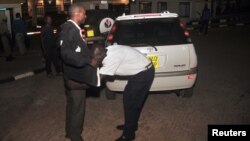Nearly 70 people were killed during the weekend in western Uganda, after gunmen attacked police and military barracks in several towns. Authorities have blamed tribal militias for the violence.
Bands of men armed with guns, machetes and spears attacked the border regions of Kasese, Bundibugyo and Ntoroko on Saturday, all in western Uganda’s Rwenzori region. They targeted police and military installations, as well as private homes.
By Monday the death toll from the attacks had risen to 68, according to army spokesman Paddy Ankunda. Ten civilians were killed, he said, along with nearly 50 of the assailants themselves.
Ankunda said the attackers were tribal militiamen, and that they were repulsed when they attacked the Ugandan army [UPDF]. Their precise motives, he said, are unknown.
“They attacked police and stole guns. They took away 13 guns, and when they attempted to attack UPDF, UPDF dealt with them," he said. "We are still investigating to find out the motives behind these attacks, and also the people who mobilized these attacks.”
No group has claimed responsibility, but experts have speculated that the violence could be linked to land-rights disputes in the area, which is home to Uganda’s newly discovered oil.
The region also borders the Democratic Republic of Congo [DRC], where armed groups have spent decades fighting for control of natural resources. One such group, the Ugandan Allied Democratic Forces, last attacked the area around Bundibugyo in 2007, and is still active in Eastern Congo.
Forty of the suspected attackers have been captured, according to Ankunda, and authorities are investigating to find out who is responsible.
The ADF-NALU Islamist insurgents fought the Ugandan government in the late 1990s and early 2000s from bases in Western Uganda along the border with DRC.
They eventually were defeated and forced to flee into the jungles of eastern DRC where they have been hiding.
Some information for this report was provied by Reuters.




